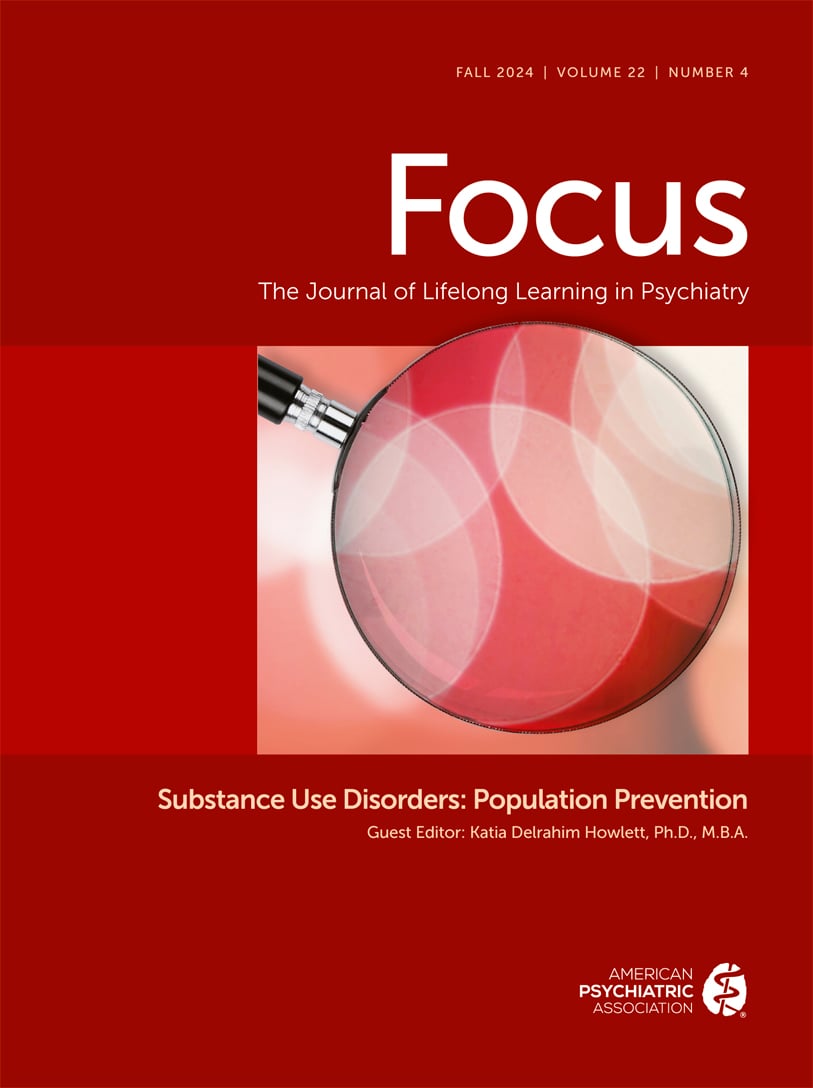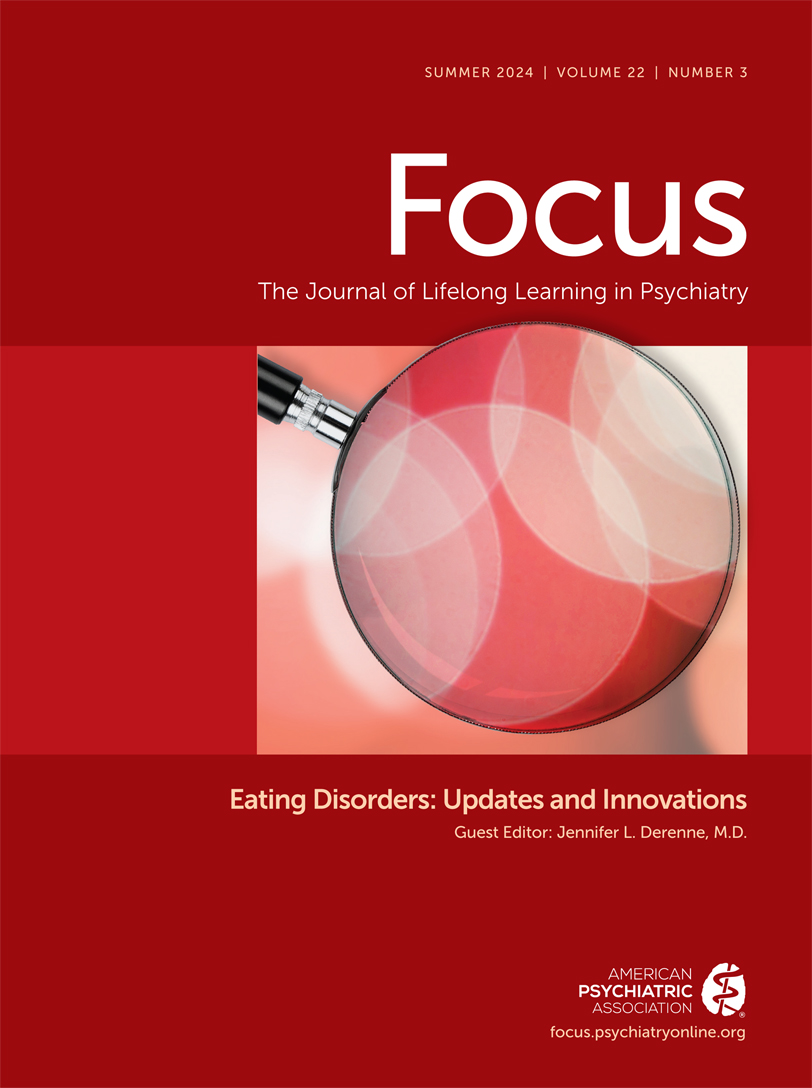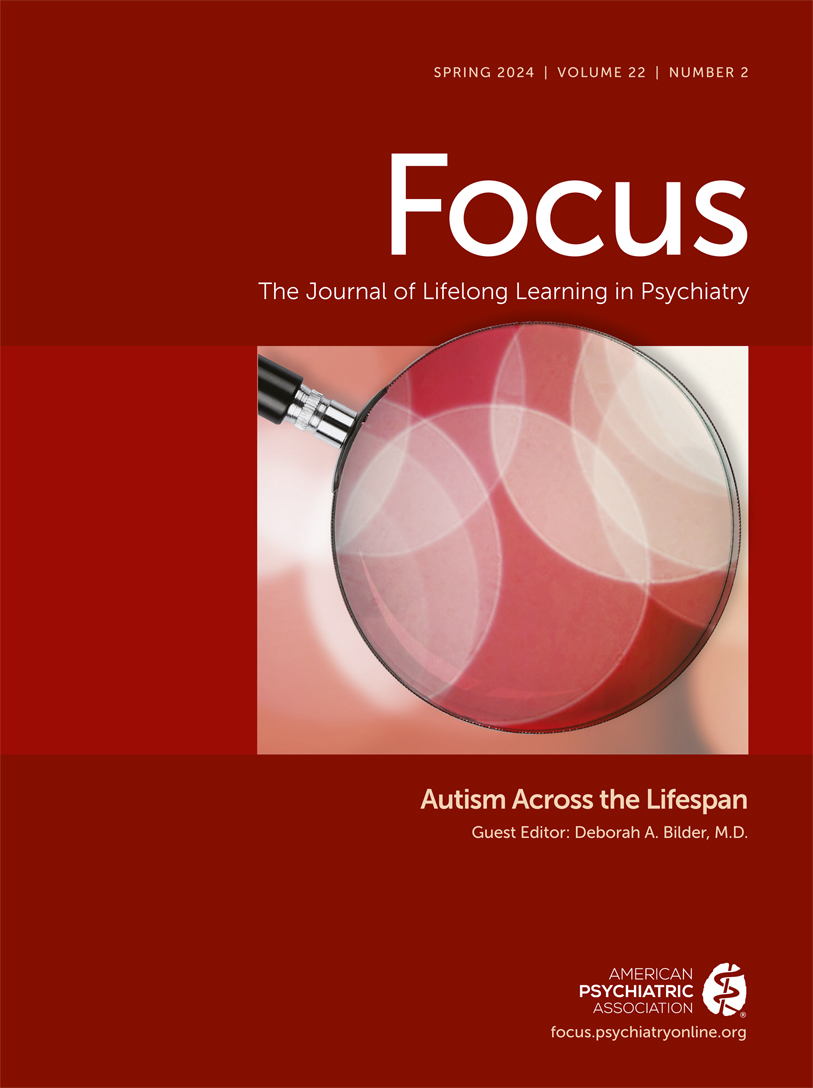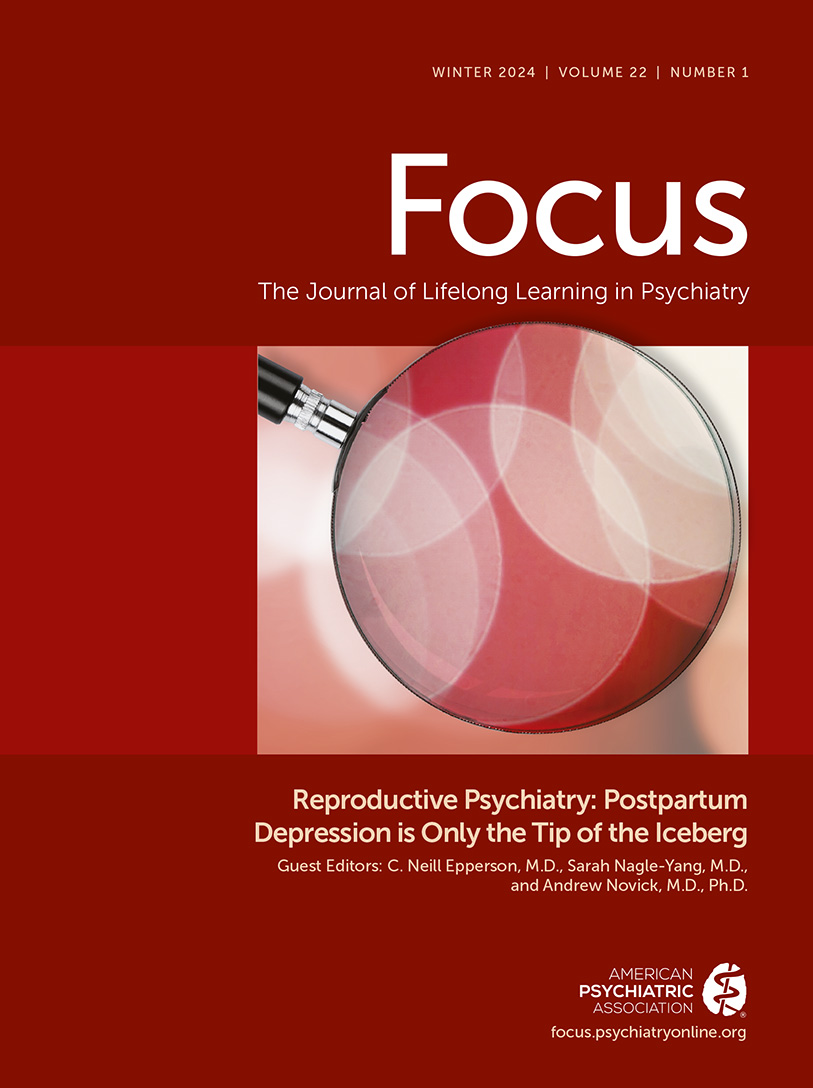Focus
- Volume 8
- Number 4
- October 2010
FROM THE GUEST EDITOR
CLINICAL SYNTHESIS
Publication date: 01 October 2010
Pages475–487Schizophrenia is a serious mental illness responsible for tremendous morbidity and decreases in quality of life and productivity. It is the eighth leading cause of disability-associated life years lost () and accounts for nearly 1.1% of overall losses ...
https://doi.org/10.1176/foc.8.4.foc475Publication date: 01 October 2010
Pages488–500Treatment-resistant depression (TRD) is a prevalent, disabling, and costly condition affecting 1%–4% of the U.S. population. Current approaches to managing TRD include medication augmentation (with lithium, thyroid hormone, buspirone, atypical ...
https://doi.org/10.1176/foc.8.4.foc488Publication date: 01 October 2010
Pages501–524Anxiety disorders are among the most common and disabling mental illnesses. While effective treatments exist, many patients—possibly even 50–60%—remain symptomatic despite first-line treatments. With the exception of obsessive compulsive disorder (OCD), ...
https://doi.org/10.1176/foc.8.4.foc501Publication date: 01 October 2010
Pages525–535To date, most therapies of treatment-refractory psychiatric disorders involve modifications of existing pharmacological treatments and/or cognitive therapies. However, many of these strategies are unable to bring these disorders into remission; therefore, ...
https://doi.org/10.1176/foc.8.4.foc525Publication date: 01 October 2010
Pages536–539This exercise is designed to test your comprehension of material presented in this issue of FOCUS as well as your ability to evaluate, diagnose, and manage clinical problems. Answer the questions below, to the best of your ability, on the information ...
https://doi.org/10.1176/foc.8.4.foc536INFLUENTIAL PUBLICATIONS
Publication date: 01 October 2010
Pages550–553This section contains a compilation of recent publications that have shaped the thinking in the field as well as classic works that remain important to the subject reviewed in this issue. This bibliography has been compiled by experts in the field and ...
https://doi.org/10.1176/foc.8.4.foc550Publication date: 01 October 2010
Pages561–569Purpose: Previous analysis of data from CATIE showed that patients randomly assigned to switch to a new medication were more likely to discontinue study drug than those who stayed on the medication they had been taking prior to randomization. This study ...
https://doi.org/10.1176/foc.8.4.foc561Publication date: 01 October 2010
Pages570–582Objective: The authors sought to determine by meta-analysis the efficacy and tolerability of adjunctive atypical antipsychotic agents in major depressive disorder. Method: Searches were conducted of MEDLINE/PubMed (1966 to January 2009), the Cochrane ...
https://doi.org/10.1176/foc.8.4.foc570Publication date: 01 October 2010
Pages583–591Background: A preliminary report in six patients suggested that deep brain stimulation (DBS) of the subcallosal cingulate gyrus (SCG) may provide benefit in treatment-resistant depression (TRD). We now report the results of these and an additional 14 ...
https://doi.org/10.1176/foc.8.4.foc583Publication date: 01 October 2010
Pages592–604Background: To compare venlafaxine and selective serotonin reuptake inhibitors (SSRIs; fluoxetine, sertraline, paroxetine, fluvoxamine, and citalopram) in the treatment of depression. Methods and Materials: Meta-analysis of 34 randomized, double-blind ...
https://doi.org/10.1176/foc.8.4.foc592Publication date: 01 October 2010
Pages605–613Objective: Second-generation antidepressants are commonly used to treat major depression in late-life. This systematic review and meta-analysis was undertaken to assess the evidence for efficacy of second-generation antidepressants in late-life major ...
https://doi.org/10.1176/foc.8.4.foc605Publication date: 01 October 2010
Pages614–625Objective: Although serotonin reuptake inhibitors (SRIs) are approved for the treatment of obsessive-compulsive disorder (OCD), most OCD patients who have received an adequate SRI trial continue to have clinically significant OCD symptoms. The purpose of ...
https://doi.org/10.1176/foc.8.4.foc614Publication date: 01 October 2010
Pages626–637Research meta-analyses have found that cognitive-behavioral therapy (CBT) is beneficial for persistent symptoms of schizophrenia. This review describes and updates the evidence base for this statement. A review of the existing literature (Medline, ...
https://doi.org/10.1176/foc.8.4.foc626Publication date: 01 October 2010
Pages638–646Objective: Impairments in adaptive life skills are a major source of disability in patients with schizophrenia. The relationship between adaptive life skills in real world settings and performance on neuropsychological tests may be complicated by other ...
https://doi.org/10.1176/foc.8.4.foc638Publication date: 01 October 2010
Pages647–653Objective: With a multitude of antidepressants available, predictors of response to different classes of antidepressants are of considerable interest. The purpose of the present study was to determine whether norepinephrine transporter gene (NET) and ...
https://doi.org/10.1176/foc.8.4.foc647Past Issues
View Issues Archive
Vol. 22 | No. 4

Vol. 22 | No. 3

Vol. 22 | No. 2
